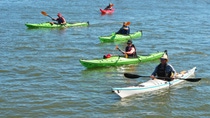BASF plastic additives add years to a kayak’s life, giving you many more summers on the water

Six feet of social distance? It’s not so hard to manage in a 10-foot kayak.
During the pandemic, Australians have taken to the water, with travel restrictions and social distancing sparking a sales boom in kayaks, canoes, and paddleboards. As soon as strict lockdown measures were eased, companies selling kayaks and canoes saw an uptick in interest from people looking to try something different and get outdoors.
Recreational equipment like kayaks are usually made of polyethylene (PE). While PE is an extremely durable material, it unfortunately can quickly degrade from sun exposure. Not only does the sun fade the colors on the beautiful kayak, but over time the plastic will become more brittle and likely to suffer serious damage. Fiberglass kayaks hold up better to ultraviolet radiation, but even they will eventually fade and become more damage prone.
But all is not lost! Matrix Polymers Australia Pty Ltd. provides our advanced stabilization solution from the Irgastab® range to several Australian kayak manufacturers to protect the polymer and maintain good physical properties, during processing and its service life. Matrix Polymers manufactures and supplies a wide range of tailored raw materials for the rotational molding industry. The company has manufacturing plants in Europe, Asia, Australia and New Zealand.
Irgastab® extends the service life of the kayak by preventing degradation from UV rays, thermal stress and oxidation, and thereby reduces waste.
“The advanced stabilization solution from the Irgastab® range creates value by optimizing the production process, thereby increasing productivity and profitability for our customers,” said Hermann Althoff, Senior Vice President of BASF’s Performance Chemicals division in Asia Pacific. “It also helps to create custom-formulated plastic equipment that are designed to be mechanically tougher and weather-resistant.”
The body of a polyethylene kayak is a long hollow shell of uniform thickness made by a process called rotational molding. By applying this process, the shell of the kayak can be molded, either in one piece or as two separate pieces which can be later joined.
Compared to highly automatic processing methods like extrusion and injection molding, the major limitation of rotomolding is its long cycle time, which greatly restricts its productivity and application for large production runs. The processing conditions of rotomolding are also much more severe due to the prolonged exposure of the polymer melt in the air.
Irgastab® is a proprietary blend composed of a processing stabilizer and light stabilizer. It is especially suitable for polyethylene and polyolefin rotational molding applications. It offers heat time reduction, provides low initial color, minimal gas fade discoloration and improved mechanical properties to the final products.